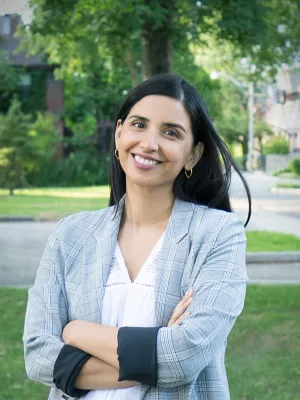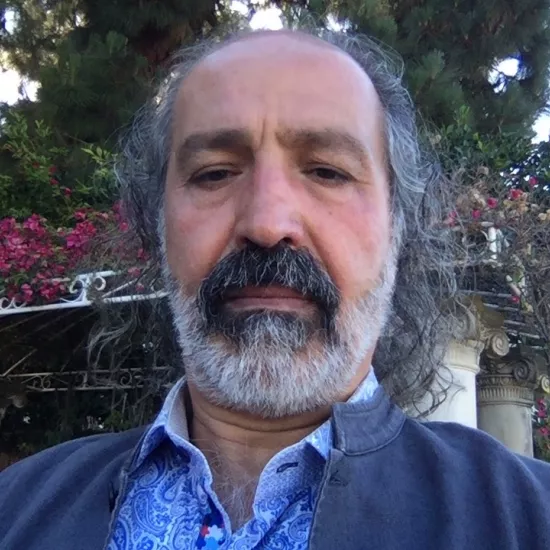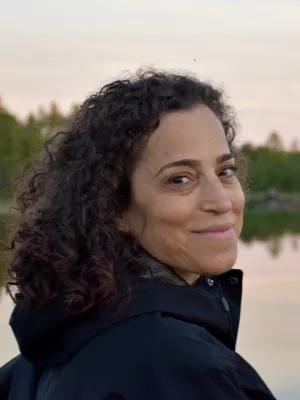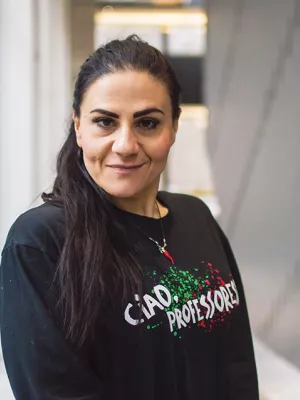
The UTM Office of the Dean, Experiential Education Unit and Mississauga Library System are proud to present Lecture Me! a series of lectures by UTM Faculty
The Lecture Me! series highlights research from different departments by UTM faculty members in a way that is approachable and fun for the whole family. This multidisciplinary series will feature a different faculty member each month who will deliver their presentation to the community about their research.
Please see below for an archive of past seasons of Lecture Me! talks.
| Date | Faculty Name | Description | Event Recording |
|---|---|---|---|
Tuesday, September 12, 2023
|  Institute for the Study of University Pedagogy | Questioning the collective imagination of contemporary issues from a science and numeracy lens Contemporary issues are understood and shaped by the collective imagination. In this lecture, I introduced young scholars to the critical thinking required to navigate perspectives and positions through quantitative reasoning and socio-scientific understanding. They use the conceptual framework of critical visualization to capture images from local societies and analyse them using frames of reference grounded in critical pedagogy, actor-network theory and place-based education. They question how socio-scientific values influence contemporary issues, and how quantitative reasoning and data interpretation validate our understanding of these contemporary issues. Some issues examined include, food security and local greenhouses, STEM careers for Black professionals, urbanization and wildlife preservation, and communication during the COVID19 pandemic. |
|
| Tuesday, October 3, 2023 | 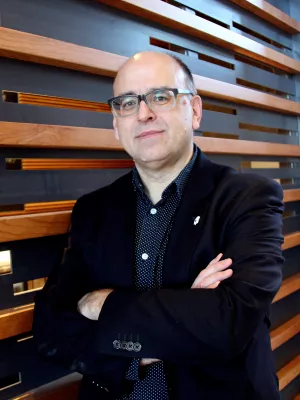 Department of Historical Studies | “We Are Our Stories”: Healing and Indigenous Films Stories are incredibly powerful. They tell us who we are. They can create, and destroy, entire communities. Indigenous storytelling has always taken many different forms, and one of the most recent forms is film. Movies have made it possible for Indigenous stories to reach, and affect, a much wider audience more quickly than ever before. In this lecture, I consider the ways in which a number of recent Indigenous films made in Canada connect with Métis scholar Jo-Ann Episkenew’s understanding of how stories can help with healing. These ways include giving voice to trauma; pushing back against colonial myths; affirming Indigenous histories and ways of knowing; and promoting joy. |
|
| Tuesday, November 7, 2023 | 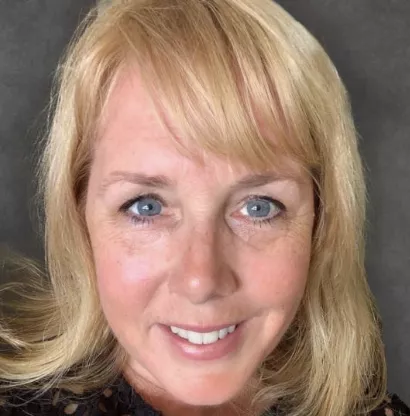 Department of Language Studies | Going Glocal: Affordance in the use of VR and AI as teacher and leadership training tools in local and global classrooms Advancements in the use of immersive technologies for teaching and learning are being described as the next revolution in how we deliver instruction. From prompt engineering to learner customization in a 4D and 360 worlds, it’s exciting for us to continue to wonder what the use of new tools like Artificial Intelligence and Virtual Reality actually look like, sound like and feel like in a classroom? In this talk we will imagine the futuristic classroom together while reflecting on the warnings and cautions from the founders of the technologies themselves. How do we temper our excitement with a methodical analysis of human- centered design principles and values to inform the way forward? This talk describes a current research project underway to assess immersive technologies as they are used to support vulnerable learners. I will also share the promise of AI and VR environments as a safe training space for future teachers and leaders to rehearse, test and refine pedagogies in both local and global classrooms. | SESSION RECORDING |
| Tuesday, February 6, 2024 | 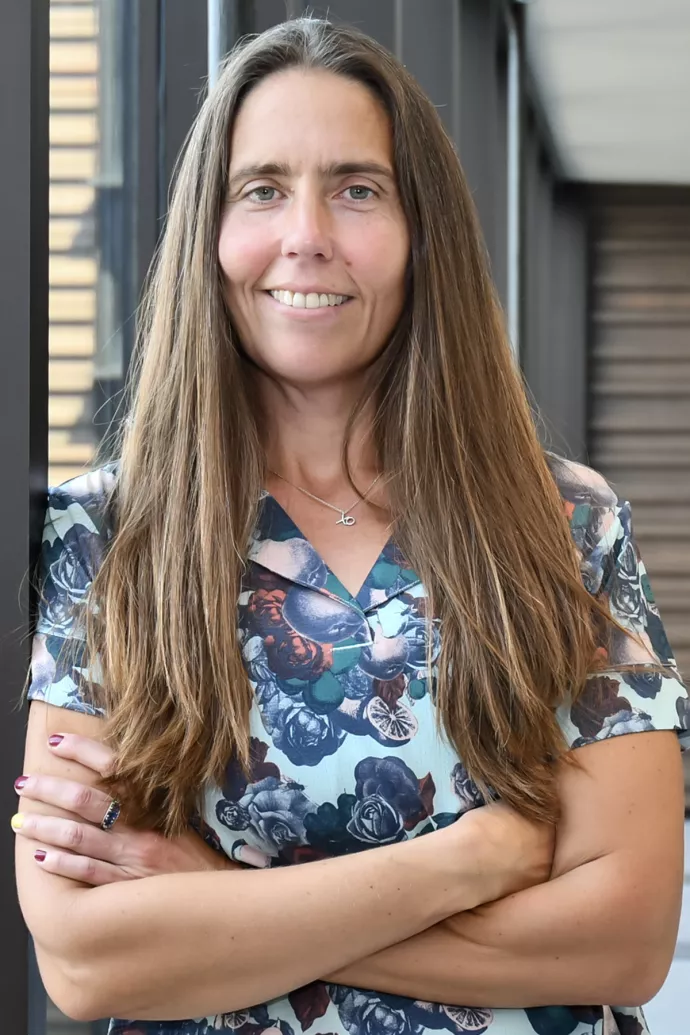 Department of Political Science Department of Geography, Geomatics and Environment
| Protecting the Prairies Canada’s grassland prairie ecosystem is iconic but under threat. This talk, based on the new book Protecting the Prairies, explores the history of grassland conservation through the life of a farmer turned politician turned conservationist. The story illustrates how conservation is for everyone and how all Canadians should get involved in protecting the places and species they love. | NOT AVAILABLE |
| Tuesday, March 5, 2024 | 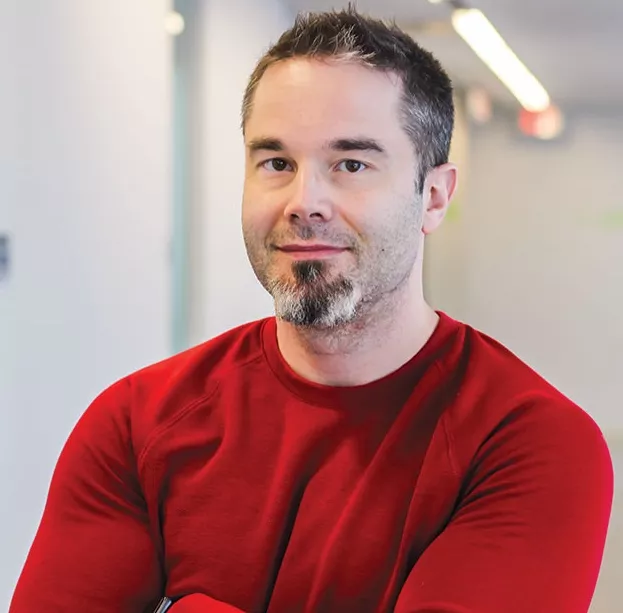 Department of Psychology | Pain and the Social Brain Human health is inextricably linked to psychological and social factors within an individual's environment. Strong social bonds correspond with better health outcomes such as reduced stress, and lower rates of anxiety and depression, and are protective against the development of chronic pain. Increasingly, pain has been recognized to occur within a social sphere and is commonly communicated to and influenced by others. While our understanding of biological and psychological processes in pain is reasonably well developed, the social dimension of pain has received far less attention. It is of considerable surprise to many that social contexts and social interactions affect pain sensitivity in laboratory animals—but such observations have been made, and interest in the topic is growing. In this lecture, I will discuss recent work done by my lab using laboratory mice that examines how pain responses are changed by the presence of another individual and the brain circuits that control these changes. Understanding the influence of social context on pain will gives us fundamental insight into the mechanisms that engage empathy and pain circuits that are crucial for survival. |
|
| Tuesday, April 2, 2024 | 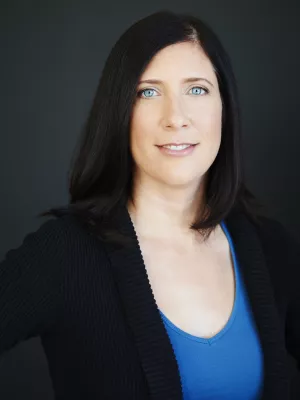 Department of Chemical and Physical Sciences | The Big One: The Where, When, and How Bad of Earthquake Science The biggest earthquake you’ve never heard of happened in Chile on February 27, 2010. It was the sixth largest ever recorded, with a magnitude of 8.8. It caused three minutes of intense shaking, and the tsunami it generated resulted in damage as far away as Japan. Yet only 550 people died in this earthquake. Compare it to what happened in Haiti just a month earlier, on January 12, 2010. That earthquake you definitely remember because it was awful, and you and countless others donated to the rescue and recovery effort. As many as 220,000 people died. But this earthquake was only a magnitude 7.0, 500 times less powerful than the Chile earthquake. What’s the difference? Prediction and preparedness. This lecture will explore how and how well we can predict the location and timing of earthquakes. We’ll also discover what makes some earthquakes so deadly. And in case you are wondering, yes, a major earthquake is possible in southern Ontario. Come find out more so you can be prepared for the next big one! | SESSION RECORDING |
| Date | Faculty Name | Description | Event Recording |
|---|---|---|---|
Tuesday, September 13, 2022
| 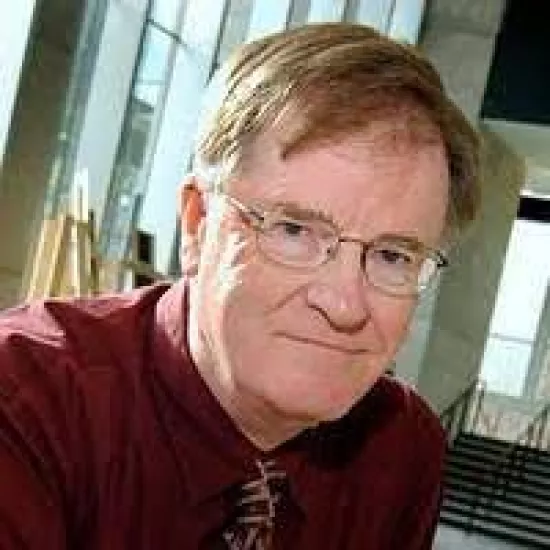 Department of Chemical & Physical Sciences | Misconceptions about the Universe: From Everyday Life to the Big Bang A misconception is a belief that is strongly held, but actually incorrect. In this profusely-illustrated, non-technical presentation, This talk will provide a gentle overview of astronomy by touching on a wide variety of common misconceptions, from everyday life (e.g., the cause of the seasons) to things in our solar system, to black holes, UFOs, and the Big Bang. I shall emphasize the many causes of these misconceptions, since these same causes are responsible for much of the other misinformation and "fake news" which is so rampant in today's society. Lots of time for Q&A. |
|
| Tuesday, October 4, 2022 | 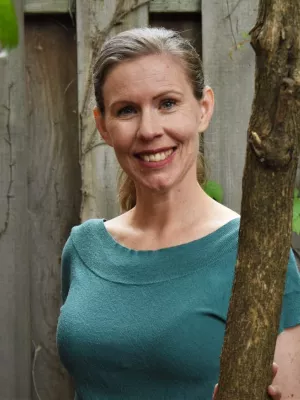 Department of Historical Studies | Demonic Infestation in 17th-Century Quebec: "The Diabolical Arts and Daily Lives of Early Canada” What can we learn about history from studying beliefs about witches and demons? In researching a case of bewitchment and demonic possession in 17th-century Quebec, Professor Cowan has gained insight into the everyday experiences and deep anxieties of colonists in early Canada. This research project has brought her from the shores of the St. Lawrence River to the Vatican archives as she follows stories about strange signs that appeared in the sky in 1660, a teenaged domestic servant who acted as if possessed, disputes between a bishop and a governor about how to respond to reports of demonic interference, treatments by nuns in a hospital, the execution of a miller accused of witchcraft, and a healing ritual performed by an unexpected agent. Mairi’s analysis of these stories shows us what the people of New France feared as both natural and supernatural threats, and reminds us that their colonial endeavour was in a precarious position. |
|
| Tuesday, November 1, 2022 | 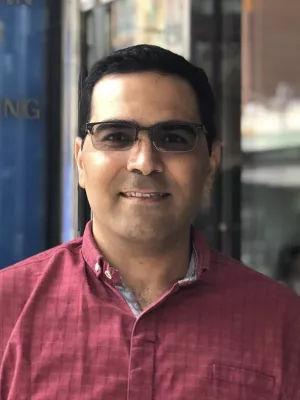 Department of Mathematical & Computational Sciences | COVID-19 Pandemic: Tracking the Global Outbreak, Statistical Modelling, Vaccine Efficacy This talk will illustrate the global outbreak of coronavirus during the first phase of the pandemic. As well as the statistical methods for modeling infectious diseases. Lastly, Professor Jazi will talk about the efficacy of the mRNA vaccine. | SESSION RECORDING |
| Tuesday, February 7, 2023 |  Department of Management
| Exprocity! The surprising Science behind Effective Team Performance Have you ever wondered how to increase engagement and achieve better performance with your team? Do you have questions about remote team management in flexible work arrangements? In this intriguing Lecture Me! talk, Dr. Rafael Chiuzi will share with you the surprising science underlying high-performing teams and some practical ideas you can apply to your life. After three years of research and hundreds of participants, Dr. Chiuzi has summarized all the evidence and will present it using real-life examples. | SESSION RECORDING |
| Tuesday, March 7, 2023 |  Institute of Communication, Culture, Information and Technology | Learning Technology Systems in Everyday Life: Women’s Experiences Navigating Refugee Resettlement This research presents findings from nine focus group discussions (n=23) with women in Washington State who have experienced forced migration and are now living in the USA. The data set additionally includes interviews with refugee service providers, including public librarians (n=21). Adopting a Feminist STS framework, and drawing on transformative research design practices, the study focuses on what types of technology education and access are available through refugee service providers, as well as addressing women’s lived experiences of technology starting in their countries of origin and moving through this migration into the USA. Distinctly, this research has engaged participants in discussions about expanded notions of technology, including tools like household appliances, transportation technology, and financial services like ATMs, in addition to digital technology like mobile phones and online media. Preliminary findings from this research offer a picture of what types of technology education and access services are available to women. Additionally, through this research we address how women learn to navigate technology systems in everyday life, across domestic, public, and government spheres. |
|
| Tuesday, April 4 , 2023 | 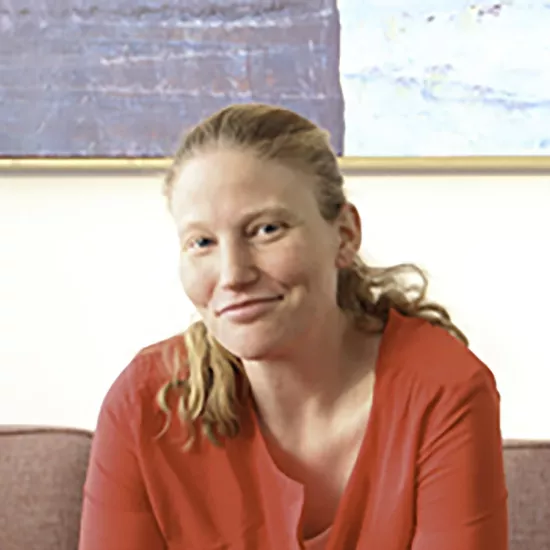 Department of Psychology | How Children Learn Language?Long before children learn to tie their shoes or ride a bike, they master language. By the age of 2, children typically know hundreds of words and are stringing together grammatically meaningful multi-word utterances. How do children master the language so quickly and seemingly effortlessly, while adults often struggle for years to simply learn to order a meal in a new language? In this talk, I will summarize the state of the art in child language acquisition. I will outline some active debates in the field (e.g., does baby talk facilitate early language acquisition) as well as debunk some classic myths about how language learning works (e.g., learning more than one language at once is detrimental to a child’s development). I will also discuss best practices for helping children develop strong language skills and summarize our recent findings regarding the pandemic’s impact on infant and toddler language development. Instructions for how you and your child can learn more about children’s development by getting actively involved in local research projects at universities in the Mississauga-Oakville area will be provided. |
|
| Date | Faculty Name | Description | Event Recordings |
|---|---|---|---|
Tuesday, September 14, 2021
| Department of Management | Naming and Framing: Perceptions of Racial Groups Racial group labels such as black, indigenous, and people of color (BIPOC); white; visible minorities; and First Nations are among many terms used to categorize people in both formal and informal contexts. Although these kinds of labels are used widely, there is uncertainty around correct or even appropriate labels to use. In this Lecture Me! talk, Dr. Sonia Kang will share recent research on preferences of racial group labels. | NOT AVAILABLE |
| Tuesday, October 5, 2021 | 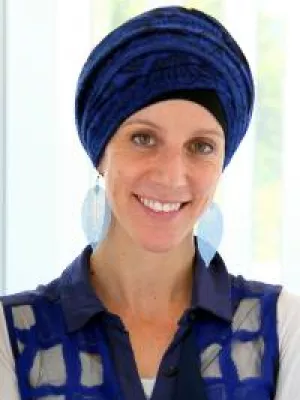 Department of Anthropology | Yoga as Development for Africa Professor Hillewaert studies the introduction of yoga and mindfulness as new forms of development in Eastern Africa. She explores why North American yoga practitioners travel to countries like Kenya to teach yoga and mindfulness and considers how local communities respond to these new ideas. What negotiating is required for "yoga as development" projects to be successful? And what does this trend tell us about the changing stakes of humanitarianism today? | NOT AVAILABLE
|
| Tuesday, November 2, 2021 | 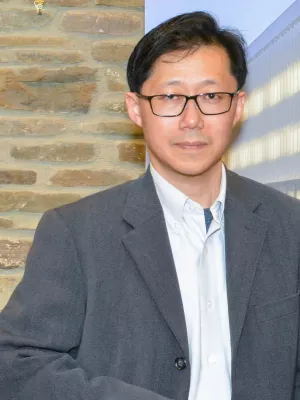 Department of Management | Risk is certain. So what does the data tell us? We’ll apply volatility models from the field of Finance to analyze | SESSION RECORDING |
| Tuesday, February 1, 2022 |  Department of Anthropology 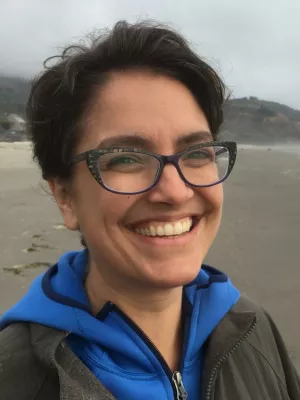 Department of Geography, Geomatics and Environment 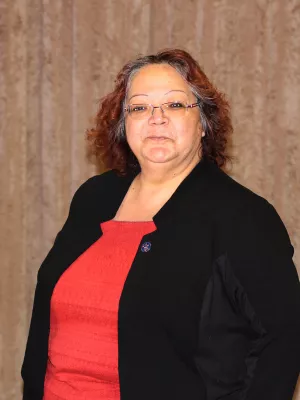 Councillor Veronica King-Jamieson Mississaugas of the Credit First Nation | Community-engaged Learning with Local Indigenous Community In this presentation we will discuss our Community-engaged Research project with the Indigenous Action Group (IAG) at the University of Toronto Mississauga. This project is a three year longitudinal mixed method research project funded by a Connaught Community Partnerships Grant to examine the influence of the IAGs CEL course “Anthropology and Indigenous Peoples in Turtle Island” (ANT241H) on the worldview of students by addressing the research question: “How does a course focused on Indigenous Ways of Knowing in a context of local Indigenous placemaking effect the long-term Indigenous-related cultural competencies of undergraduate students? The IAG will examine the effect of this CEL course on students’ academic learning, civic activism, and personal growth until 2023. This research project pivots from traditional Community-engaged research (CER) with Indigenous communities by having the community study the educational institution. We are just beginning to analyze the data collected in the first two iterations of ANT241H through student pre and post course surveys, student reflections and term work, and longitudinal post-course interviews for up to three years. In 2020, we published an article on the goals of the CEL course entitled “Community-engaged learning: Integrating anthropological discourse with Indigenous knowledge”. https://www.teachinganthropology.org/ojs/index.php/teach_anth/article/view/561/600
| SESSION RECORDING |
| Tuesday, March 1, 2022 | 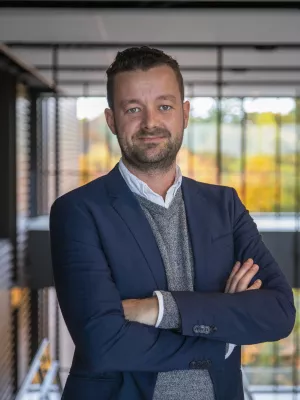 Forensic Science Program Department of Philosophy | Psychopaths: Dangerous Social Predators or Stigmatizing Cultural Lore? Psychopathy is a psychiatric syndrome associated with chronic behaviors and a profound lack of conscience. A Stereotypical psychopath is commonly described as a dangerous social predator, utterly incapable of empathy and remorse. In this talk, Professor Larsen presents the surprising results from recent research, which he thinks not only challenge widespread beliefs about psychopaths, but also question the existence of the syndrome itself. |
|
| Tuesday, April 5, 2022 | 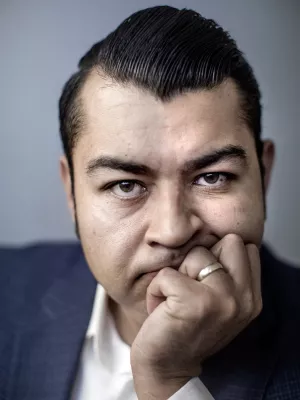 Department of Sociology | Disappearing in the City: An Urban Ethnography of Missing or Murdered Indigenous Women This talk will investigate the factors that place Indigenous women at risk of experiencing interpersonal and institutional forms of violence in large urban settings like Toronto where most Indigenous women are last seen alive and well. | SESSION RECORDING |
| Date | Faculty Name | Description |
|---|---|---|
Tuesday, September 15, 2020
| 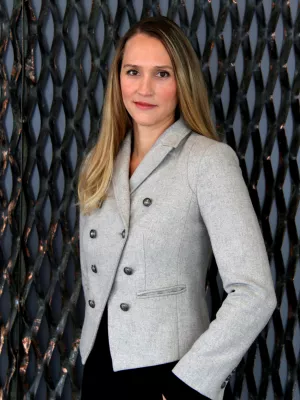 Department of Psychology | Overriding the Stress Response Professor Judith Andersen studies stress and resilience among first responders. In this talk, she will share intervention techniques successful in reducing stress during crisis. |
| Tuesday, October 6, 2020 | Department of Historical Studies | Pathologizing Iran and Islam Professor Tavakoli-Targhi explores how the cholera epidemic in the 19th century facilitated the deployment of medical prognosis and diagnosis in Iranian politics. It also explains how the shift from humoral to microbial hygiene led to the reconceiving of jinns as germs, and the emergence of a Pasteurian conception of Islam focused on social, spiritual, and political health. |
| Tuesday, November 10, 2020 | 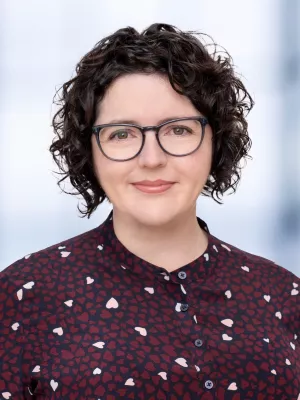 Professor Erin Tolley Department of Political Science | Rhymes with Witch Professor Tolley examines how ideas about gender influence the media's coverage of politics. She draws on current and historical examples to document the different ways that men and women in politics are publicly portrayed and how this is affected by gendered stereotypes about politics. She concludes by discussing the effects of media coverage on electoral democracy. |
| Tuesday, January 12, 2021 |
| A Land of Her Own: Tales of Three Women Authors from Quebec Literature Quebec offers a fertile ground for authors of a variety of origins, cultures, and languages who are united by several common factors: transculturation, immigration, identity and alterity, memory, and relationship with French, among others. This talk will present diverse ways that these topics are depicted by three authors from Quebec; KimThúy, Ying Chen, and Aki Shimazaki. Participants will be invited to reflect on how the authors’ stories relate to their own thoughts and experiences. |
| Tuesday, February 2, 2021 | 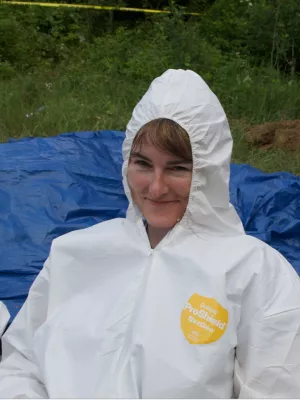 Forensic Science Program & Department of Anthropology | Found: Human Remains Join Dr. Tracy Rogers to discover how human remains cases are investigated. |
| Tuesday, March 2, 2021 | The Big One: The Where, When, and How Bad of Earthquake Science Cooking is a primal way of expressing love and hospitality. It is also how many people express their creativity. In this latter manner, it is very much like fine art: painting, music, poetry, dance, and the rest. So why do so many thinkers deny that cuisine is a form of art? In this talk, I'll try to explain, and show that, the nay-saying notwithstanding, cooking can be an art form. | |
| Tuesday, April 6, 2021 | 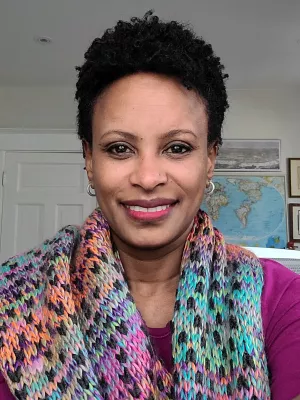 Institute of Communication, Culture, Information and Technology | Communicating during COVID-19: China and the Diaspora After the novel coronavirus (COVID-19) was first detected in China in December 2019, it spread rapidly, threatening lives as well as social, economic, and emotional well-being in one of the world's most densely populated countries. People relied more heavily on technologies to stay connected to each other, to shop online, and acquire information. This talk is about people's uses of technologies during a pandemic. |
| Date | Faculty Name | Description |
|---|---|---|
Tuesday, September 17, 2019
| Moby Dick's Latest Fight: Why Plastic and Sound in our Oceans Matter We thought oceans were limitless, filled with danger and mystery. While some mystery remains, we now realize that our reach is more impactful and expansive than previously imagined. This presentation traces some changes in the oceans with a focus on whales. We will examine how the increasing presence of sounds and plastic affect whales, and how these impacts reflect changes and concerns on the oceans. | |
| Tuesday, October 8, 2019 | Coping with the Cold: The Winter Ecology of Freshwater Fishes Will shorter winters under a changing global climate be ‘bad’ or ‘good’ for freshwater fishes in Ontario? | |
| Tuesday, November 5, 2019 | Grandmothers Behind the Scenes Research shows that mothers’ mental health is essential to family wellbeing, especially for immigrants and resettled refugees. In this talk, Dr. Kahil brings attention to an understudied population: grandmothers. Through personal narratives from recently conducted interviews with Syrian newcomer mothers and grandmothers in the GTA, Kahil highlights the behind-the-scenes influence of grandmothers on the emotional wellbeing of their daughters and granddaughters. The talk will show the significance of grandmothers for the settlement of newcomer families and offer some suggestions for what this means for the future of Canadian society. | |
| Tuesday, February 4, 2020 | Climate Change: Taking the Earth's Temperature Professor Moore has for over 25 years taken the earth’s temperature and done in depth analysis on how and why it is changing. He has flown through winter storms in the Arctic, climbed some of our highest peaks, measured Arctic sea ice and examined ice cores. Now, he would like to share his findings and thoughts with you, so, you can better understand what climate change means to you. | |
| Tuesday, March 3, 2020 | Italian-Canadian Foodways: Redefining Italian Culinary Culture Participants will embark on a North American food tour as the talk explores the influence that Italian immigration has had on food, from recipes and traditions to eateries and industries, both locally and abroad. Fastening the link between consumption and identity, we will chart the ways in which food is replete with cultural meaning: what it represented when immigrated, and how it became (and remains) one of the most important contributions to Italian cultural identity. | |
| Tuesday, April 7, 2020 | 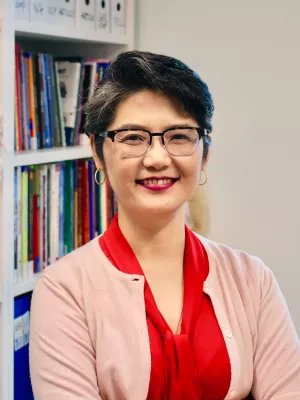 Department of Language Studies | A Land of Her Own: Tales of Three Women Authors from Quebec Literature Quebec offers a fertile ground for authors of a variety of origins, cultures, and languages who are united by several common factors: transculturation, immigration, identity and alterity, memory, and relationship with French, among others. This talk will present diverse ways that these topics are depicted by three authors from Quebec; KimThúy, Ying Chen, and Aki Shimazaki. Participants will be invited to reflect on how the authors’ stories relate to their own thoughts and experiences. ***CANCELLED*** |
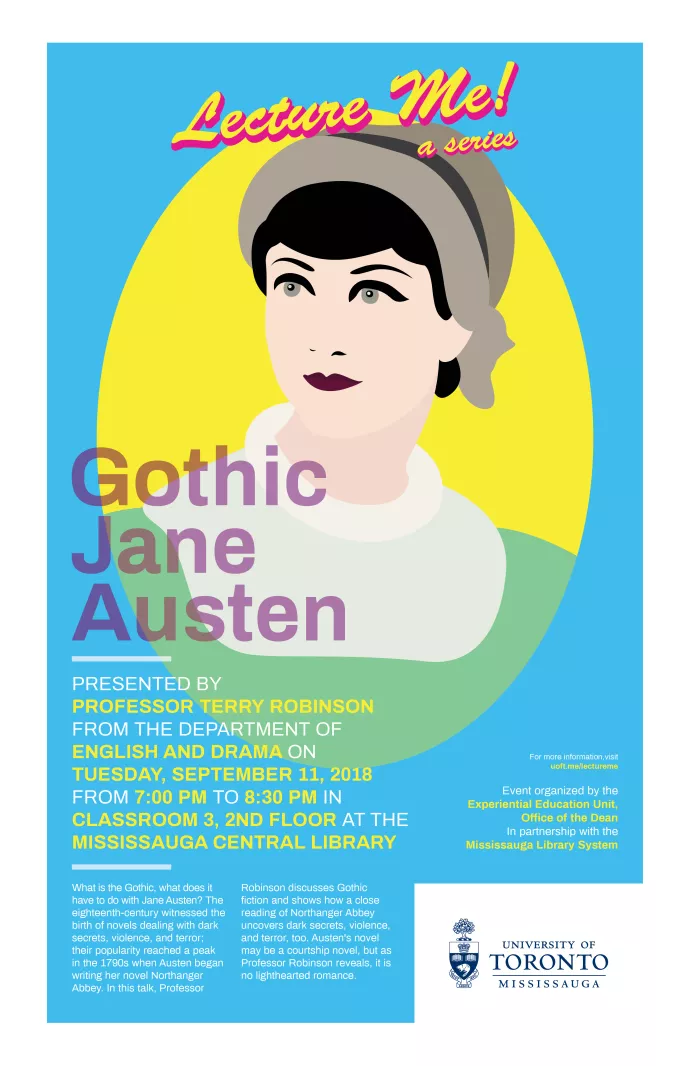
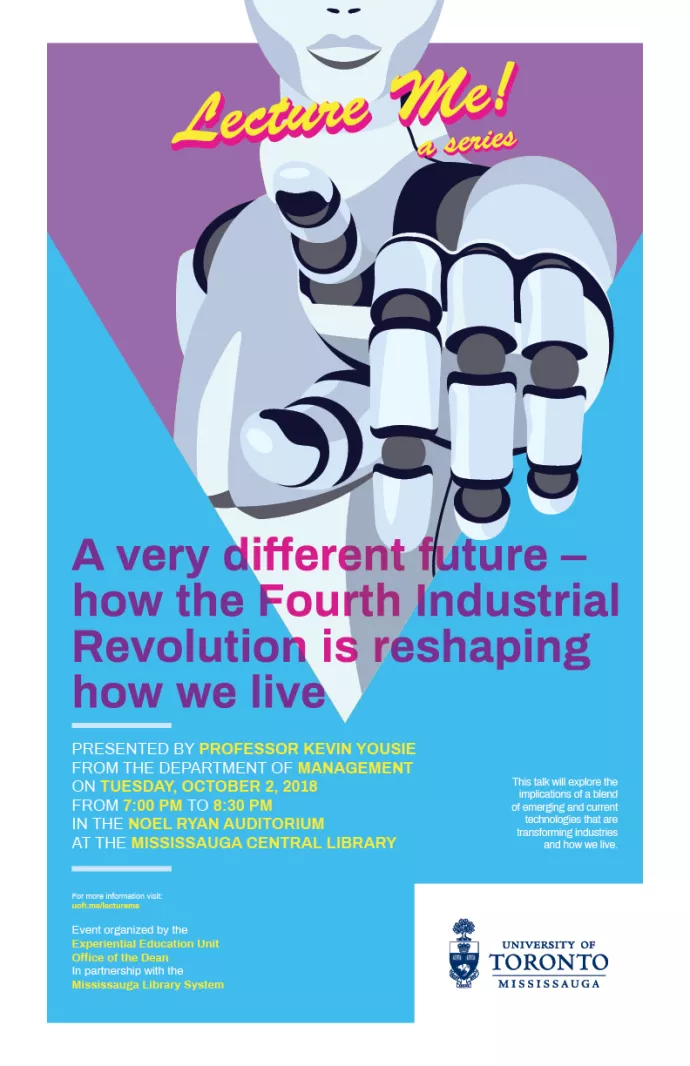
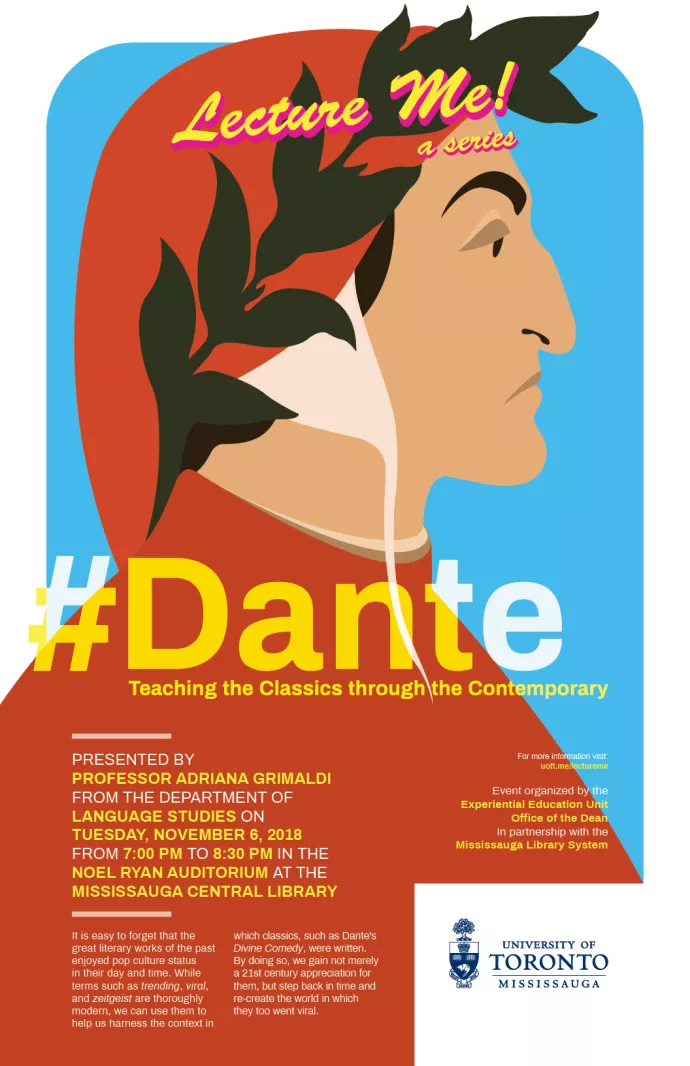
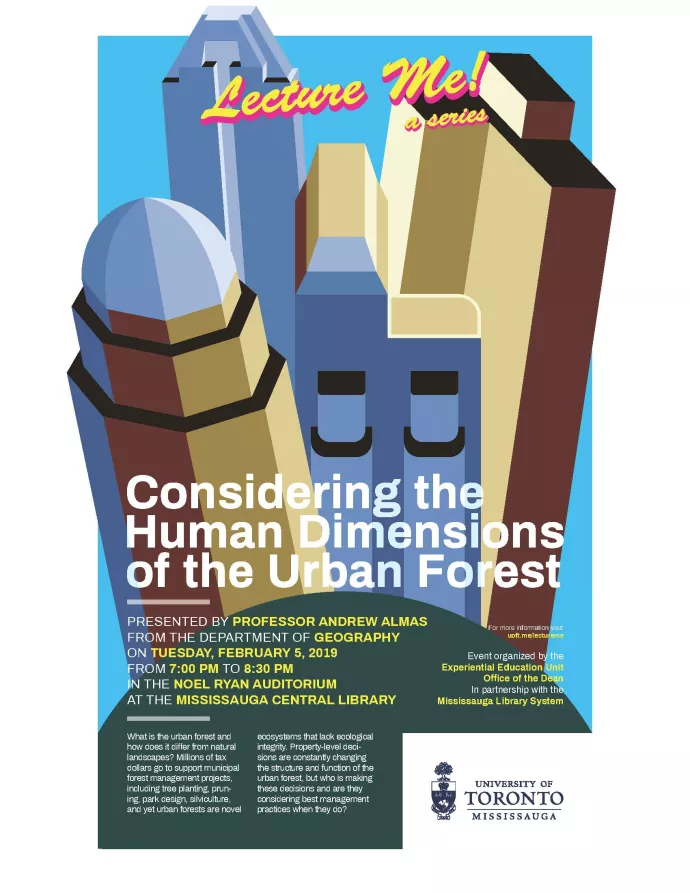
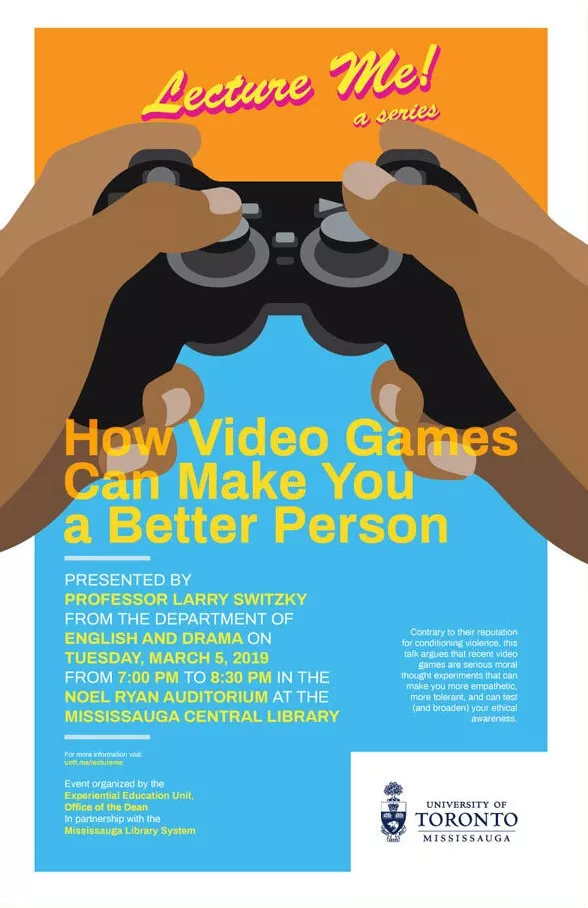
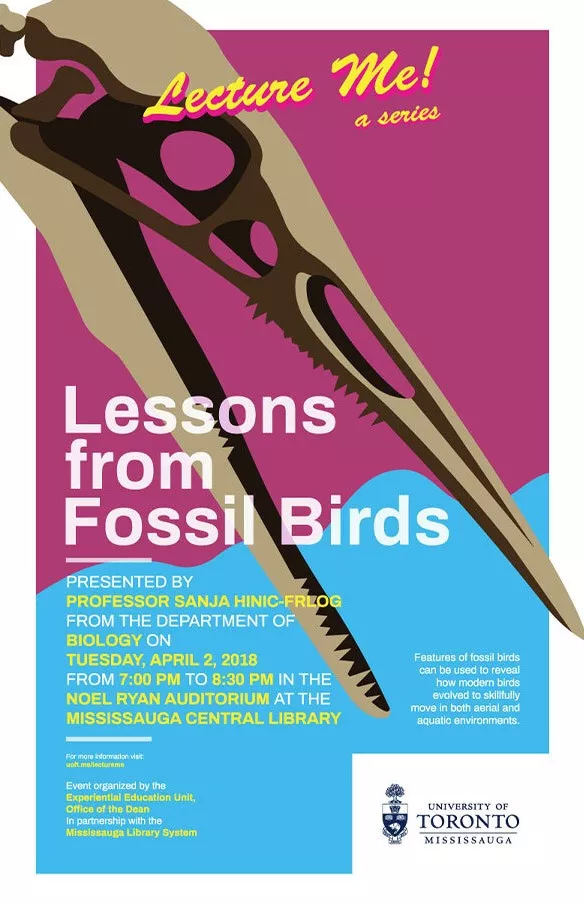
| Date | Faculty Name | Description |
|---|---|---|
Tuesday, September 11, 2018
| Gothic Jane Austen What is the Gothic, what does it have to do with Jane Austen? The eighteenth-century witnessed the birth of novels dealing with dark secrets, violence, and terror; their popularity reached a peak in the 1790s when Austen began writing her novel Northanger Abbey. In this talk, Professor Robinson discusses Gothic fiction and shows how a close reading of Northanger Abbey uncovers dark secrets, violence, and terror, too. Austen's novel may be a courtship novel, but as Professor Robinson reveals, it is no lighthearted romance. | |
| Tuesday, October 2, 2018 | A Very Different Future: How the Fourth Industrial Revolution is Reshaping How We Live This talk will explore the implications of a blend of emerging and current technologies that are transforming industries and how we live. | |
| Tuesday, November 6, 2018 | #Dante: Teaching the Classics Through the Contemporary It is easy to forget that the great literary works of the past enjoyed pop culture status in their day and time. While terms such as trending, viral, and zeitgeist are thoroughly modern, we can use them to help us harness the context in which classics, such as Dante's Divine Comedy, were written. By doing so, we gain not merely a 21st century appreciation for them, but step back in time and re-create the world in which they too went viral. | |
| Tuesday, February 5, 2019 | Professor Andrew Almas Department of Geography, Geomatics and Environment | Considering the Human Dimensions of the Urban Forest What is the urban forest and how does it differ from natural landscapes? Millions of tax dollars go to support municipal forest management projects, including tree planting, pruning, park design, silviculture, and yet urban forests are novel ecosystems that lack ecological integrity. Property-level decisions are constantly changing the structure and function of the urban forest, but who is making these decisions and are they considering best management practices when they do? |
| Tuesday, March 5, 2019 | How Video Games Can Make You a Better Person Contrary to their reputation for conditioning violence, this talk argues that recent video games are serious moral thought experiments can make you more empathetic, more tolerant, and can test (and broaden) your ethical awareness. | |
| Tuesday, April 2, 2019 | Department of Biology | Lessons from the Fossil Birds Features of fossil birds can be used to reveal how modern birds evolved to skillfully move in both aerial and aquatic environments |
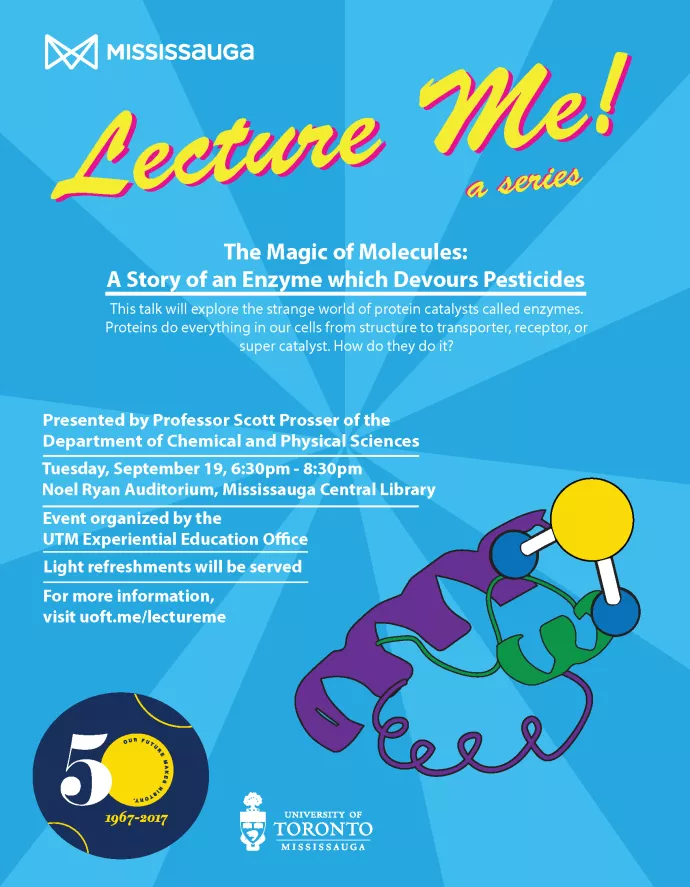
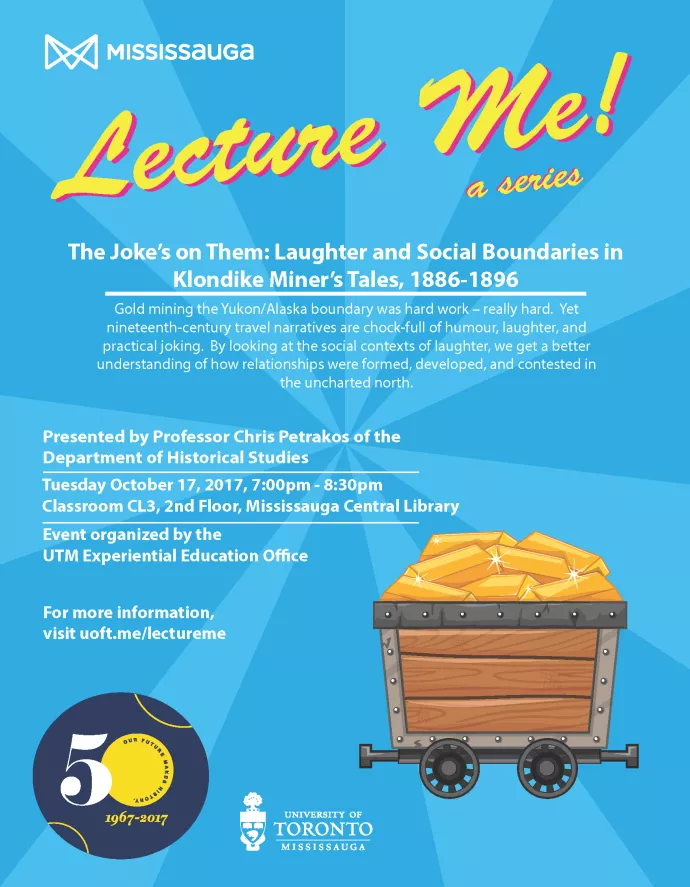
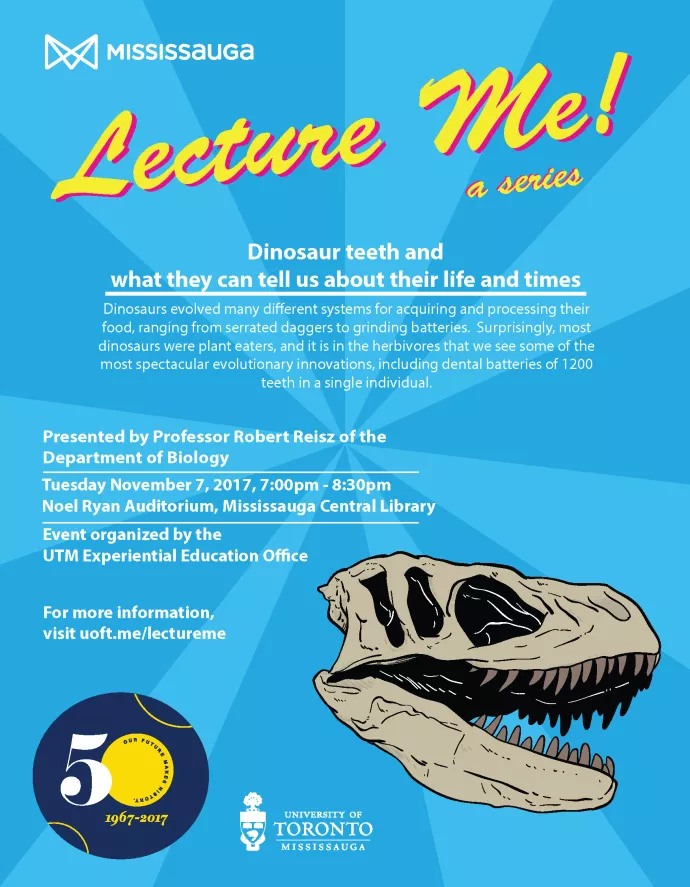
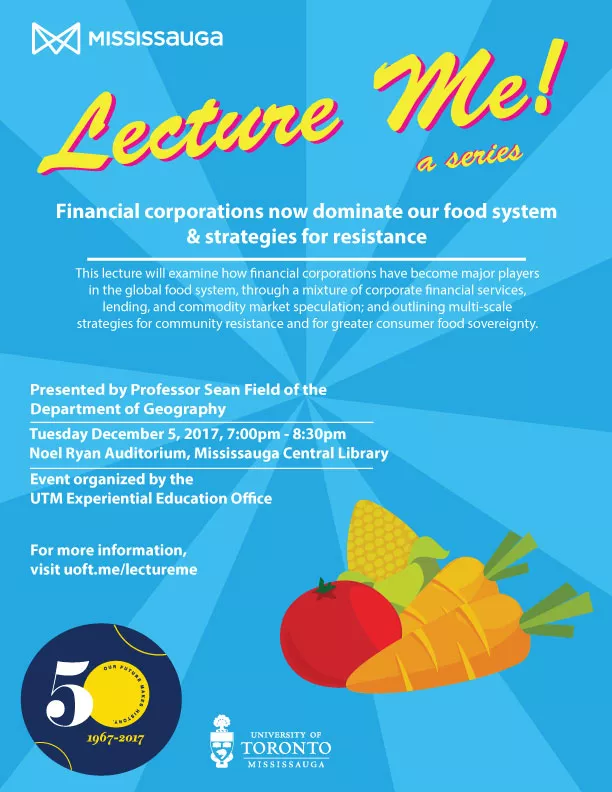
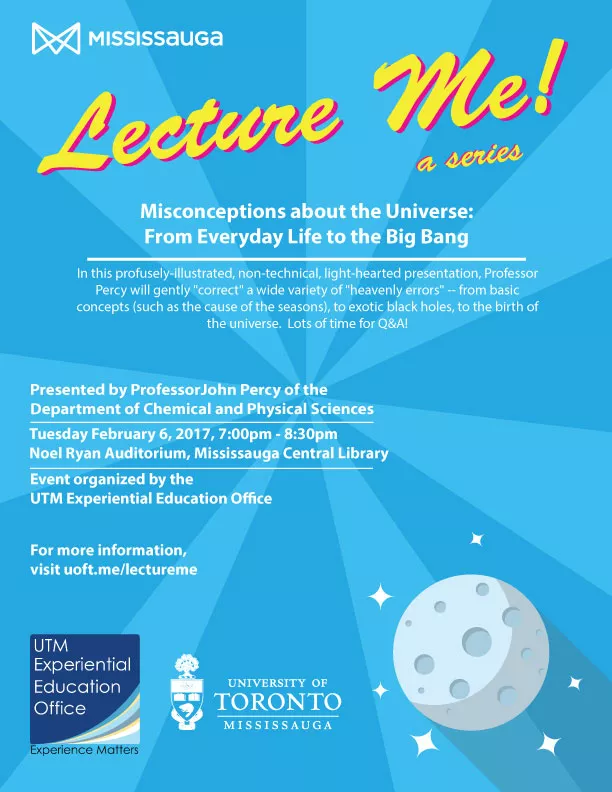
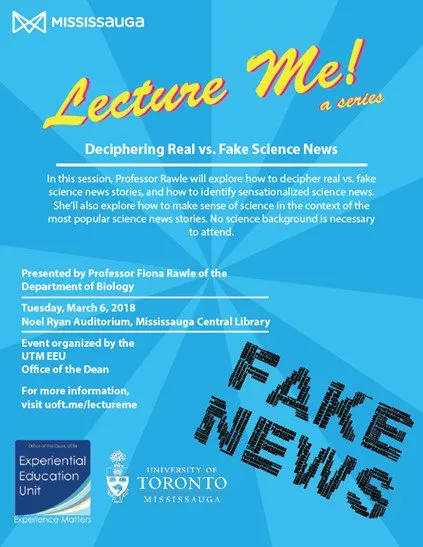
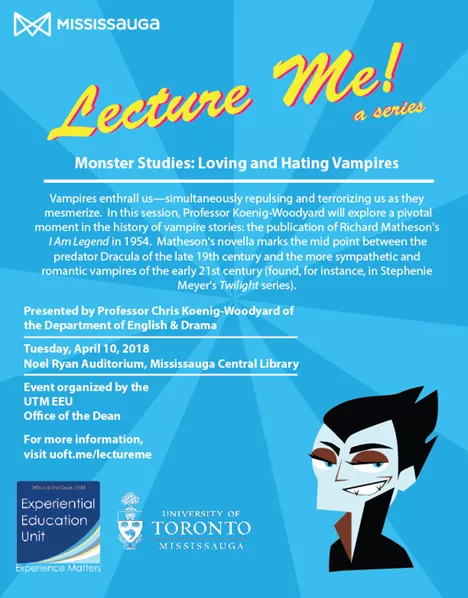
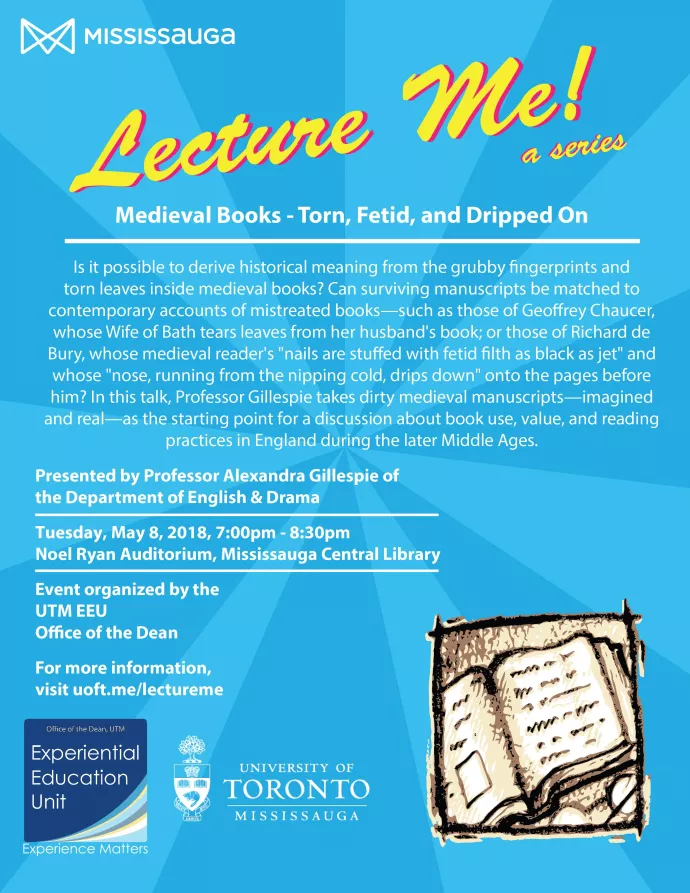
| Date | Faculty Name | Description |
|---|---|---|
Tuesday, September 19, 2017
| Department of Chemical and Physical Sciences | The Magic of Molecules: A Story of an Enzyme which Devours Pesticides This talk will explore the strange world of protein catalysts called enzymes. Proteins do everything in our cells from structure to transporter, receptor, or super catalyst. How do they do it? |
| Tuesday, October 17, 2017 | Department of Historical Studies | The Joke's on Them: Laughter and Social Boundaries in Klondike Miner's Tales, 1886-1896 This talk will explain the role of laughter in developing and contesting relationships during the 1890s' Klondike gold rush by studying miners' tales taken from this fabled time in the North. |
| Tuesday, November 7, 2017 | Department of Biology | Dinosaur Teeth and What They Can Tell Us About Their Life and Times Dinosaurs evolved many different systems for acquiring and processing their food, ranging from serrated daggers to grinding batteries. Surprisingly, most dinosaurs were plant eaters, and it is in the herbivores that we see some of the most spectacular evolutionary innovations. |
| Tuesday, December 5, 2017 | Professor Sean Field Department of Geography, Geomatics and Environment | Financial Corporations Now Dominate Our Food System & Strategies for Resistance This lecture will examine how financial corporations have become major players in the global food system, through a mixture of corporate financial services, lending, and commodity market speculation; and outlining multi-scale strategies for community resistance and for greater consumer food sovereignty. |
| Tuesday, February 6, 2018 | Misconceptions about the Universe: From Everyday Life to the Big Bang In this profusely-illustrated, non-technical, light-hearted presentation, Professor Percy will gently "correct" a wide variety of "heavenly errors" -- from basic concepts (such as the cause of the seasons), to exotic black holes, to the birth of the universe. Lots of time for Q&A! | |
| Tuesday, March 6, 2018 | Deciphering Real vs Fake Science News In this session, we’ll explore how to decipher real vs fake science news stories, and to identify sensationalized science news. We’ll also explore how to make sense of science in the context of the most popular science news stories. No science background is necessary to attend. | |
| Tuesday, April 10, 2018 | Professor Chris Koenig-Woodyard Department of English & Drama | Monster Studies: Loving and Hating Vampires Vampires enthrall us--simultaneously repulsing and terrorizing us as they mesmerize. This talk explores a pivotal moment in the history of vampire stories: the publication of Richard Matheson's I Am Legend in 1954. Matheson's novella marks the mid point between the predator Dracula of the late 19th century and the more sympathetic and romantic vampires of the early 21st century (found, for instance, in Stephenie Meyer's Twilight series). |
| Tuesday, May 8, 2018 | Department of English & Drama | Medieval Books - Torn, Fetid and Dripped On Is it possible to derive historical meaning from the grubby fingerprints and torn leaves that scholars find inside medieval books? Can surviving medieval manuscripts be matched to contemporary accounts of the mistreatment of books - those of Geoffrey Chaucer, whose Wife of Bath famously tears leaves from her husband's book; or those of the fourteenth-century bibliophile Richard de Bury, whose medieval reader's "nails are stuffed with fetid filth as black as jet" and whose "nose, running from the nipping cold, drips down" onto the pages before him? This paper takes dirty medieval manuscripts - imagined and real - as the starting point for an argument about book use, value, and reading practices in England in the later Middle Ages. |
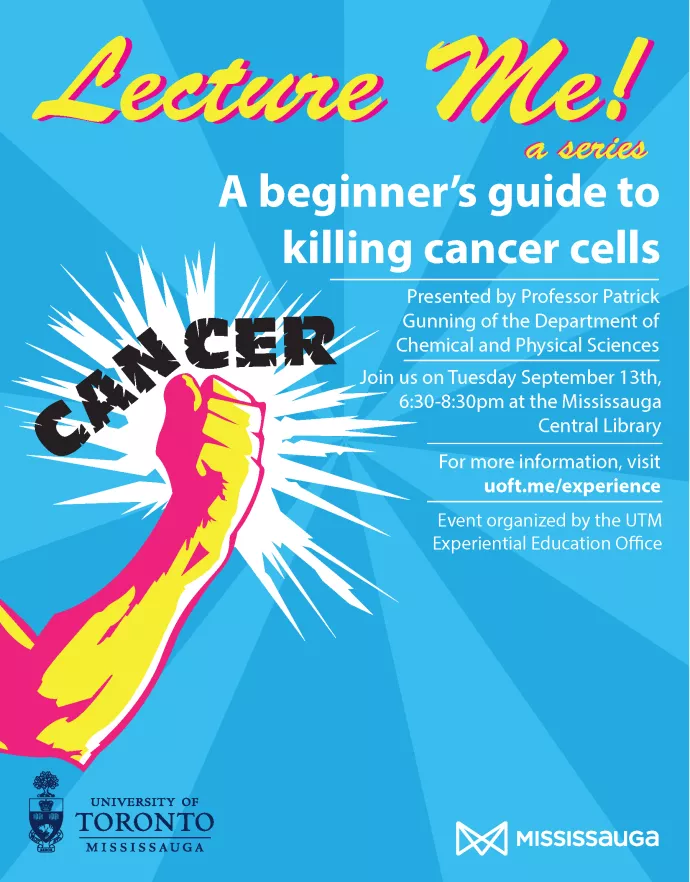
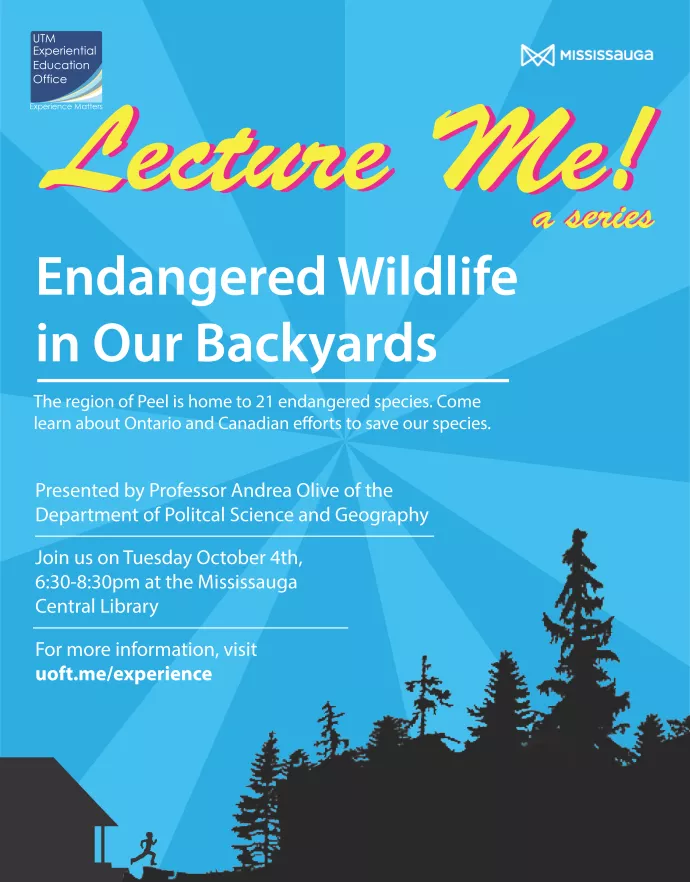
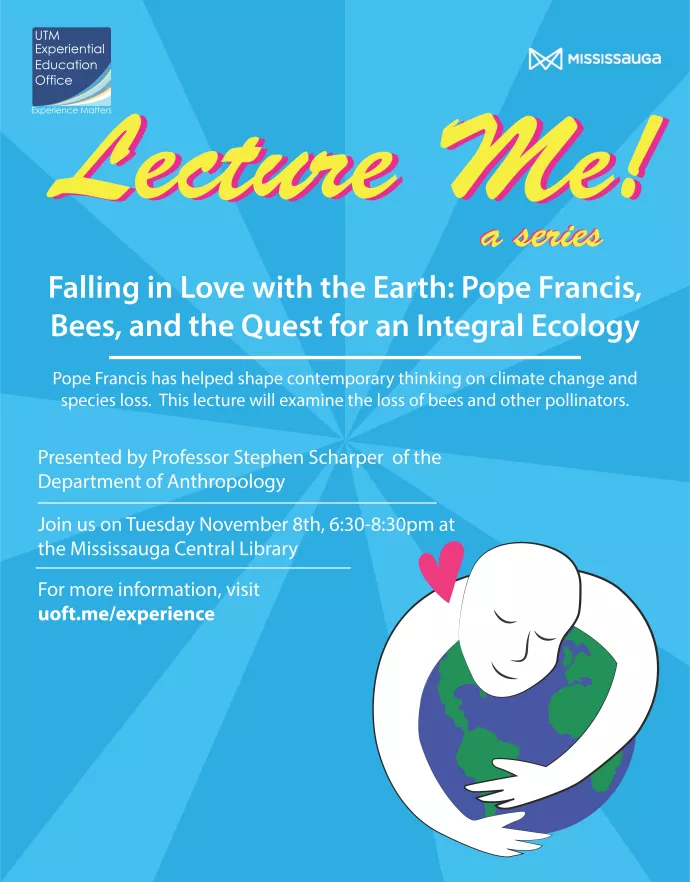
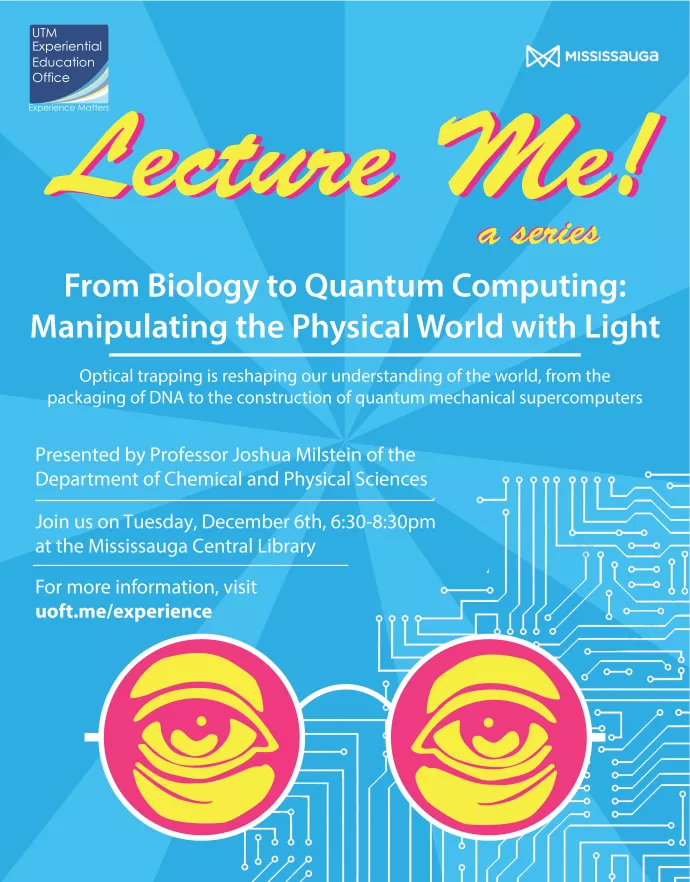
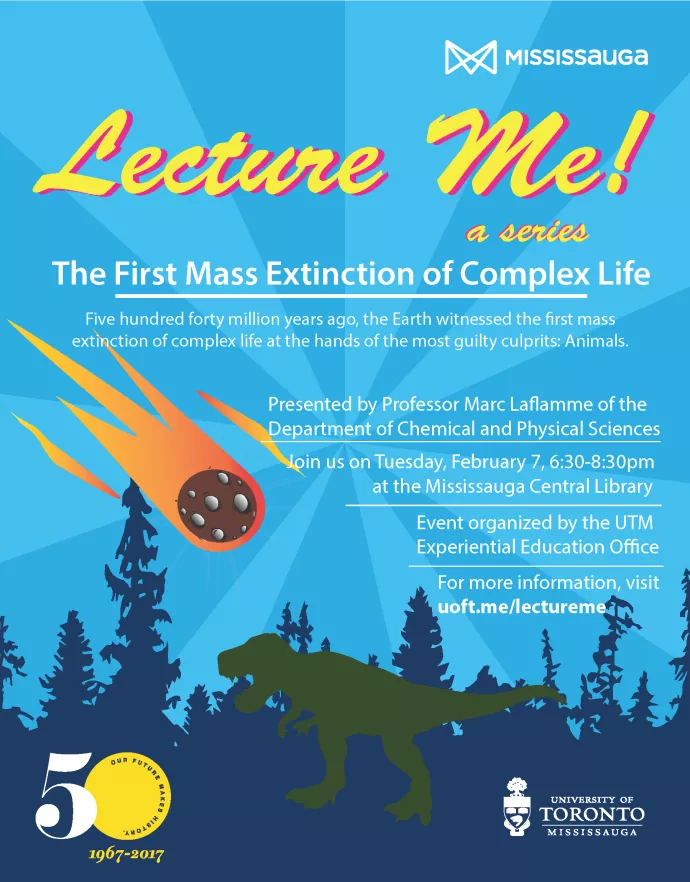
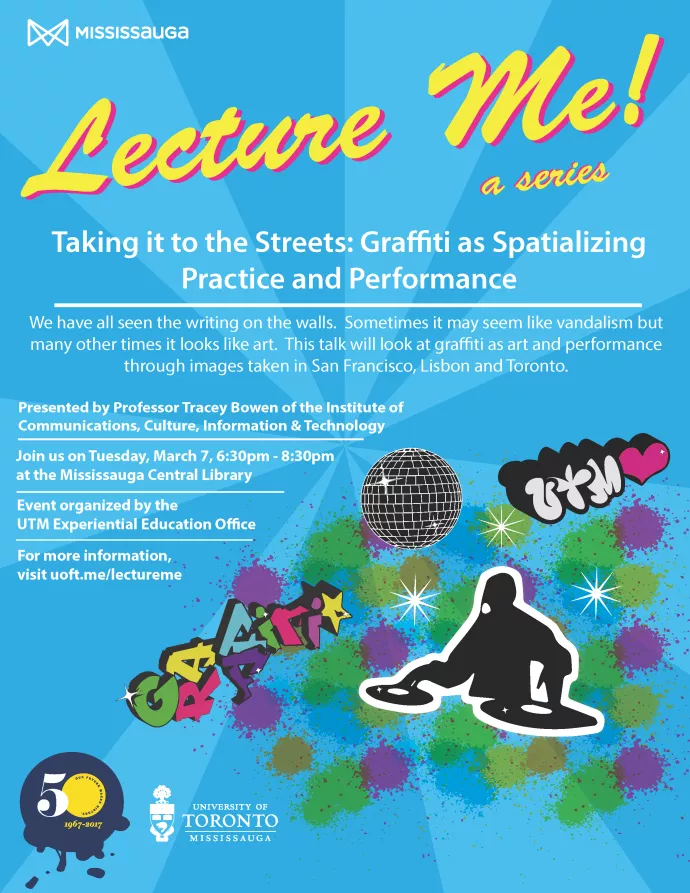
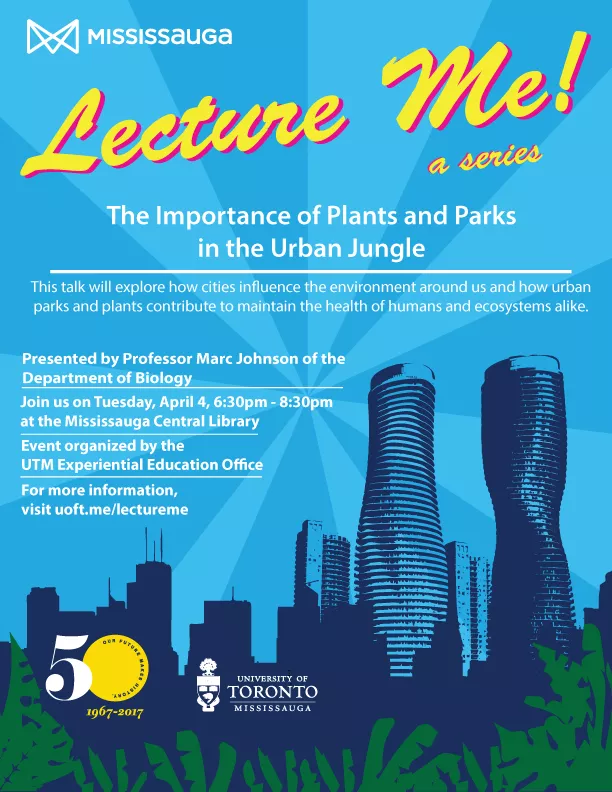
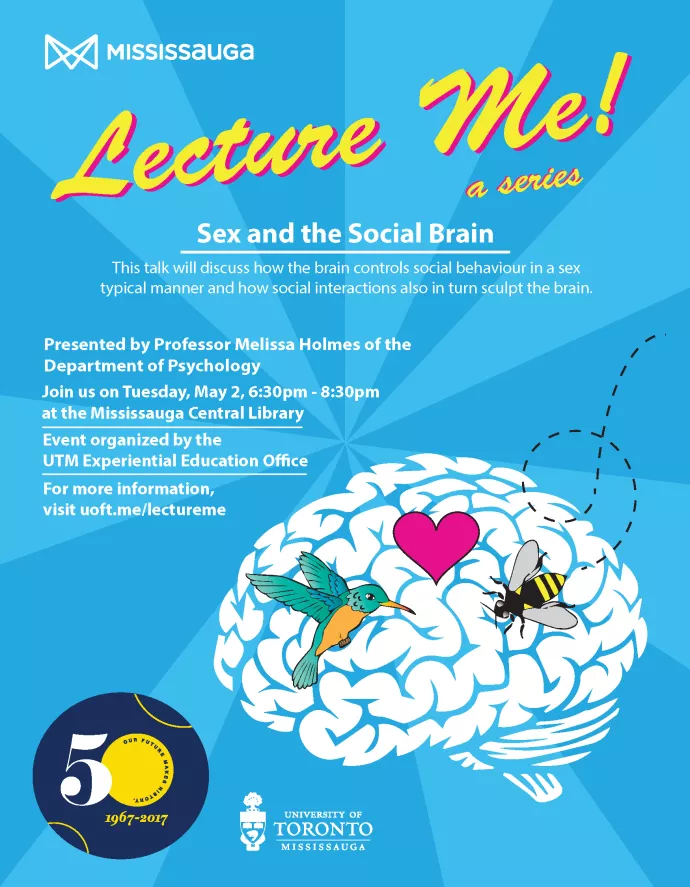
| Date | Faculty Name | Description | |
|---|---|---|---|
Tuesday, September 13, 2016
| Department of Chemical and Physical Sciences | A Beginner’s Guide to Killing Cancer Cells What if we could engineer a molecule to target cancer cells but leave healthy cells unharmed? An in-depth look into the latest researchon STAT3. | |
| Tuesday, October 4, 2016 | Department of Political Science Department of Geography, Geomatics and Environment | Endangered Wildlife in Our Backyards The Region of Peel is home to 21 endangered species. Come learn about Ontario and Canadian efforts to save our species. | |
| Tuesday, November 8, 2016 | Department of Anthropology | Falling in Love with the Earth: Pope Francis, Bees, and the Quest for an Integral Ecology Pope Francis has helped shape contemporary thinking on climate change and species loss. This lecture will examine the loss of bees and other pollinators. | |
| Tuesday, December 6, 2016 | Department of Chemical and Physical Sciences | From Biology to Quantum Computing: Manipulating the Physical World with Light Optical trapping is reshaping our understanding of the world, from the packaging of DNA to the construction of quantum mechanical supercomputers. | |
| Tuesday, February 7, 2017 | Department of Chemical and Physical Sciences | The First Mass Extinction of Complex Life Five hundred forty million years ago, the Earth witnessed the first mass extinction of complex life at the hands of the most guilty of culprits: Animals. | |
| Tuesday, March 7, 2017 | Institute of Communication, Culture, Information and Technology | Taking it to the Street: Graffiti as Spatializing Practice and Performance We have all seen the writing on the walls. Sometimes it may seem like vandalism, but many other times it looks like art. This talk will look at graffiti as art and performance through images taken in San Francisco, Lisbon and Toronto. | |
| Tuesday, April 4, 2017 | Department of Biology | The Importance of Plants and Parks in the Urban Jungle This talk will explore how cities influence the environment around us and how urban parks and plants contribue to maintain the health of humans and ecosystems alike. | |
| Tuesday, May 2, 2017 | Department of Psychology | Sex and the Social Brain This talk will discuss how the brain controls social behaviour in a sex typical manner and how social interactions also in turn sculpt the brain. |
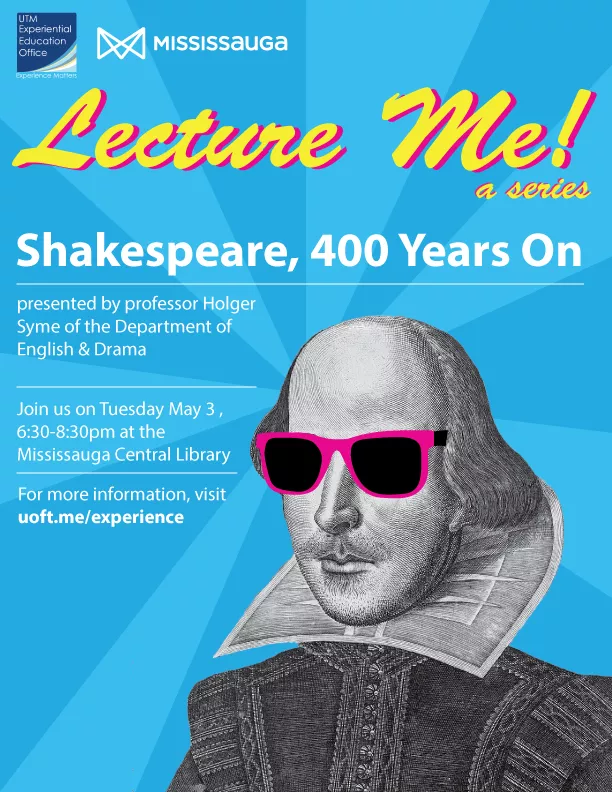
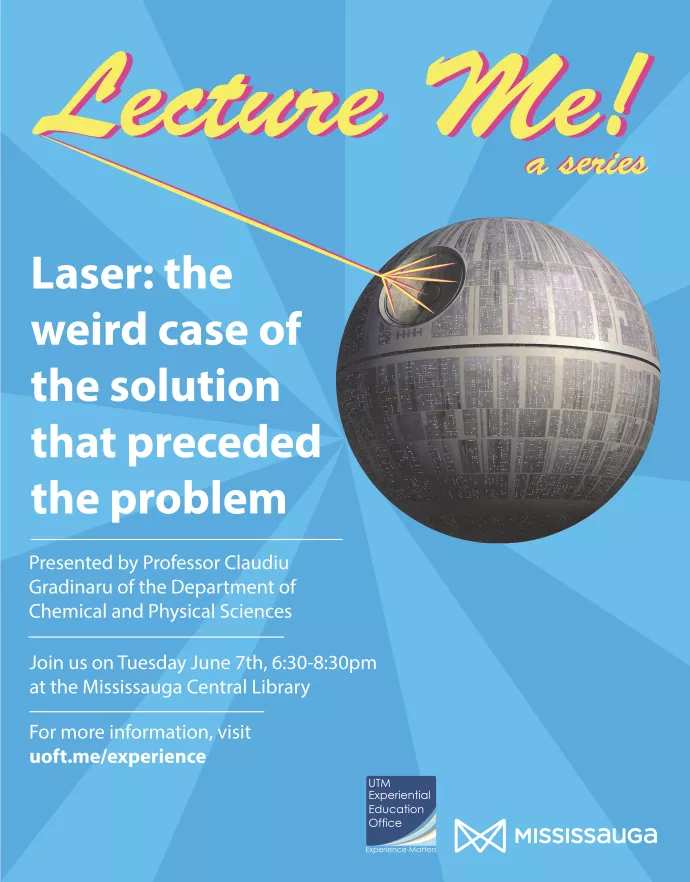
| Date | Faculty Name | Title |
|---|---|---|
Tuesday, May 3, 2016
| Shakespeare, 400 Years On | |
| Tuesday, June 7, 2016 | Department of Chemical and Physical Sciences | Laser: the Weird Case of the Solution That Preceded the Problem |

